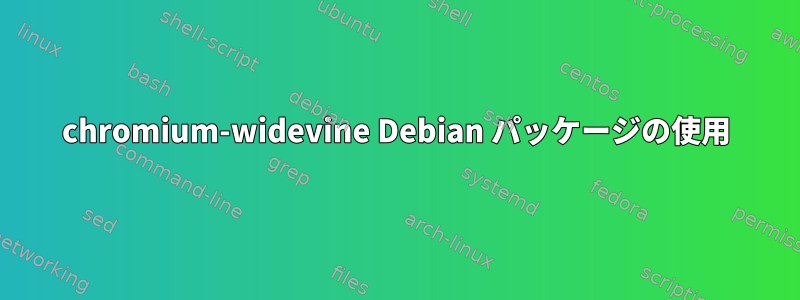
Debianには、少なくともDebian 9(拡張リリース)からcontribパッケージが含まれています
chromium-widevine。このパッケージの説明は次のとおりです。
このパッケージは、Widevineコンテンツ復号化モジュールのサポートを提供します。
ただし、このパッケージをインストールした後、Chromiumはこのプラグインを認識またはロードしているという兆候を見つけることができません。このパッケージ内のWidevineの場所はです/usr/lib/chromium/libwidevinecdmadapter.so。
現在、このパッケージを使用してChromiumでAmazon Prime Videoを再生しています。現在のエラーが発生します。
あなたのウェブブラウザにデジタル権限コンポーネントがありません。 chrome://comComponentsにアクセスして、WidevineCdmで[アップデートの確認]をクリックします。
chrome://comComponents は Chromium の下に WidevineCdm をリストしません。
見知らぬものについては、次のような結果が得られます。
root@orwell:/usr/lib/chromium# ldd libwidevinecdmadapter.so
linux-vdso.so.1 (0x00007ffccbfad000)
libwidevinecdm.so => not found
libpthread.so.0 => /lib/x86_64-linux-gnu/libpthread.so.0 (0x00007f08c6e5b000)
libstdc++.so.6 => /usr/lib/x86_64-linux-gnu/libstdc++.so.6 (0x00007f08c6ad3000)
libc.so.6 => /lib/x86_64-linux-gnu/libc.so.6 (0x00007f08c6733000)
/lib64/ld-linux-x86-64.so.2 (0x000055e84bdbe000)
libm.so.6 => /lib/x86_64-linux-gnu/libm.so.6 (0x00007f08c642b000)
libgcc_s.so.1 => /lib/x86_64-linux-gnu/libgcc_s.so.1 (0x00007f08c6213000)
それではlibwidevinecdm.so何も行われませんでしたか?
ここで何をすべきか知っていますか?chromium-widevine進行方法に関する文書や指示はありません。
注:この質問は、chromium-widevineパッケージがもう存在しないため、少なくともDebian 10 / busterから古いものです。
答え1
chromium-widevinecontribリポジトリのDebian 9.3でnetflixを使用できる運はありません。私がしたことは次のとおりです。
wget https://dl.google.com/widevine-cdm/1.4.8.1008-linux-x64.zip
unzip 1.4.8.1008-linux-x64.zip
sudo mkdir /usr/lib/chromium
sudo mv libwidevinecdm.so /usr/lib/chromium
sudo chmod 644 /usr/lib/chromium/libwidevinecdm.so
答え2
Debianでは、公式ディストリビューションに含まれるすべてのパッケージがフリーソフトウェアであると述べていますが、Widevine CDMライブラリはこのカテゴリには属しません。利用可能なバイナリブロブがあります。Chromeリファレンスビルドしかし。
答え3
ChromeからWidevineをダウンロードしてインストールするためにArch Linuxで見つけたスクリプトを更新しました。 Chromeのインストールディレクトリパスのみを更新するだけです。主な違いは、ダウンロードしたアーカイブに含まれているマニフェストもインストールするため、Widevineのバージョンがchrome://comComponentsを介してchromiumに表示されることです。ここにいる:
#!/bin/sh
# For ARM use this instead
# https://gist.github.com/ruario/19a28d98d29d34ec9b184c42e5f8bf29
available () {
command -v "$1" >/dev/null 2>&1
}
# Make sure we have wget or curl
if available wget; then
SILENT_DL="wget -qO-"
LOUD_DL="wget"
elif available curl; then
SILENT_DL="curl -s"
LOUD_DL="curl -O"
else
echo "Install wget or curl" >&2
exit 1
fi
# Set Output dir
#WIDEVINE_DIR="${WIDEVINE_INSTALL_DIR:-/opt/google/chrome}"
#WIDEVINE_DIR="${WIDEVINE_INSTALL_DIR:-/usr/lib/chromium}"
WIDEVINE_DIR="${WIDEVINE_INSTALL_DIR:-/usr/lib/chromium-browser}"
# Use the architecture of the current machine or whatever the user has set
# externally
ARCH="${ARCH:-$(uname -m)}"
case "$ARCH" in
x86_64) WIDEVINE_ARCH="x64"
WIDEVINE_INSTALL_DIR="$WIDEVINE_DIR/WidevineCdm/_platform_specific/linux_x64" ;;
i?86) WIDEVINE_ARCH="ia32"
WIDEVINE_INSTALL_DIR="$WIDEVINE_DIR/WidevineCdm/_platform_specific/linux_x86" ;;
arm*) echo "For ARM use https://gist.github.com/ruario/19a28d98d29d34ec9b184c42e5f8bf29 instead" >&2 ; exit 1 ;;
*) echo "The architecture $ARCH is not supported." >&2 ; exit 1 ;;
esac
# Set temp dir
TMP="${TMP:-/tmp}"
# Set staging dir
STAGINGDIR="$TMP/widevine-staging"
# Work out the latest Widevine version
#WIDEVINE_VERSION="${WIDEVINE_VERSION:-$($SILENT_DL https://dl.google.com/widevine-cdm/current.txt)}"
WIDEVINE_VERSION="${WIDEVINE_VERSION:-$($SILENT_DL https://dl.google.com/widevine-cdm/versions.txt | tail -n1)}"
echo latest Version: $WIDEVINE_VERSION
# Error out if $CDMVERISON is unset, e.g. because previous command failed
if [ -z "$WIDEVINE_VERSION" ]; then
echo "Could not work out the latest version; exiting" >&2
exit 1
fi
# Find current installed version
INSTALLED_VERSION=$(grep '"version":' $WIDEVINE_DIR/WidevineCdm/manifest.json|cut -f4 -d'"')
# Don't start repackaging if the same version is already installed
if [ $WIDEVINE_VERSION = $INSTALLED_VERSION ]; then
echo "The latest Widevine ($WIDEVINE_VERSION) is already installed"
exit 0
fi
# If the staging directory is already present from the past, clear it down and
# re-create it.
if [ -d "$STAGINGDIR" ]; then
rm -fr "$STAGINGDIR"
fi
# Stop on any error
set -eu
# Make and switch to the staging directory
mkdir -p "$STAGINGDIR"
cd "$STAGINGDIR"
# Now get the latest widevine zip for the users architecture
$LOUD_DL "https://dl.google.com/widevine-cdm/${WIDEVINE_VERSION}-linux-${WIDEVINE_ARCH}.zip"
# Extract the contents of Widevine package
if available unzip; then
unzip "${WIDEVINE_VERSION}-linux-${WIDEVINE_ARCH}.zip" libwidevinecdm.so
unzip "${WIDEVINE_VERSION}-linux-${WIDEVINE_ARCH}.zip" manifest.json
elif available bsdtar; then
bsdtar xf "${WIDEVINE_VERSION}-linux-${WIDEVINE_ARCH}.zip" libwidevinecdm.so
bsdtar xf "${WIDEVINE_VERSION}-linux-${WIDEVINE_ARCH}.zip" manifest.json
else
# The user's system has no obvious handler for Zip files. GZip can extract
# the first entry from a Zip. If libwidevinecdm.so is the first entry, we
# might just pull this off! ;)
missing_extractor_error () {
echo "Install InfoZip Unzip or BSD tar" >&2
exit 1
}
# Look in first 50 bytes for libwidevinecdm.so as it'll be mentioned there
# if it is the first entry in the zip
if head -c50 "${WIDEVINE_VERSION}-linux-${WIDEVINE_ARCH}.zip" | grep -Fq libwidevinecdm.so; then
# Hide the warning about multiple entries and ensure an exit code of 0
gzip -d < "${WIDEVINE_VERSION}-linux-${WIDEVINE_ARCH}.zip" > libwidevinecdm.so 2> /dev/null ||:
# Check that it looks like an executable
if ! file libwidevinecdm.so | grep -Fq ELF; then
missing_extractor_error
fi
else
missing_extractor_error
fi
fi
# Add version number file
#touch "widevine-$WIDEVINE_VERSION"
#SED_PAR="s/\"version\": \".*\"/\"version\": \"$WIDEVINE_VERSION\"/"
#if [ -e $WIDEVINE_DIR/WidevineCdm/manifest.json ]; then
# sed $WIDEVINE_DIR/WidevineCdm/manifest.json -e "$SED_PAR" >$STAGINGDIR/manifest.json
#fi
# Escalate privileges if needed and copy files into place
#SED_PAR="s/\"version\": \".*\"/\"version\": \"$WIDEVINE_VERSION\"/"
if [ "$USER" = "root" ]; then
install -Dm644 libwidevinecdm.so "$WIDEVINE_INSTALL_DIR/libwidevinecdm.so"
if [ -e $STAGINGDIR/manifest.json ]; then
# mv $WIDEVINE_DIR/WidevineCdm/manifest_neu.json $WIDEVINE_DIR/WidevineCdm/manifest.json
install -Dm644 manifest.json "$WIDEVINE_DIR/WidevineCdm/manifest.json"
fi
elif [ -r /etc/os-release ] && grep -qxE 'ID=((ubuntu)|(debiiian))' /etc/os-release; then
echo "Calling sudo ... If prompted, please enter your password so Widevine can be copied into place"
sudo install -Dm644 libwidevinecdm.so "$WIDEVINE_INSTALL_DIR/libwidevinecdm.so"
if [ -e "$WIDEVINE_INSTALL_DIR/libwidevinecdm.so" ]; then
if [ -e $STAGINGDIR/manifest.json ]; then
sudo install -Dm644 manifest.json "$WIDEVINE_DIR/WidevineCdm/manifest.json"
fi
else
echo "Something went wrong installing libwidevinecdm.so" >&2
exit 1
fi
else
echo "Please enter your root password so Widevine can be copied into place"
su -c "sh -c \"install -Dm644 libwidevinecdm.so $WIDEVINE_INSTALL_DIR/libwidevinecdm.so && install -Dm644 manifest.json $WIDEVINE_DIR/WidevineCdm/manifest.json\""
fi
# Tell the user we are done
echo "Widevine ($WIDEVINE_VERSION) installed into $WIDEVINE_INSTALL_DIR/"
答え4
chromium-widevine Debianパッケージが見つからなかったため、「Google ChromeなしでWidevineを個別にインストールする」という選択肢を使用しました。https://github.com/proprietary/chromium-widevine?tab=readme-ov-file#alternative-install-widevine-alone-without-google-chrome。
最新のWidevineバージョンを確認するGitHubのこのスクリプトを使用できます。https://dl.google.com/widevine-cdm/versions.txt次のものをダウンロードしてください(アーキテクチャに応じてx64またはx32)。https://dl.google.com/widevine-cdm/4.10.2710.0-linux-x64.zipChromiumフォルダにこのディレクトリ構造を作成する前に(Debianでは/usr/lib/chromium/で始まりますが、Linuxディストリビューションによっては変更される可能性があります):
/usr/lib/chromium/WidevineCdm
├── LICENSE
├── manifest.json
└── _platform_specific
└── linux_x64
└── libwidevinecdm.so
さらに、スクリプトはフォルダに権限 755 を追加し、ファイルに権限 644 を追加します。


